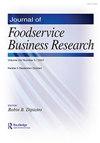快餐车的增长会威胁到餐馆的可持续性吗?证据来自对美国企业的全国性分析
Q2 Agricultural and Biological Sciences
引用次数: 0
摘要
摘要本文考察了美国食品卡车行业的增长是否像餐馆老板及其盟友经常声称的那样损害了餐馆。在动态面板数据分析中使用12年的全国数据,我们探讨了一个县一年内更多的食品卡车是否等同于次年同一县的餐馆数量减少。结果表明,一年内快餐车的数量与下一年餐馆数量的减少没有显著相关。然而,一年中食品卡车的数量与同年餐馆的数量呈显著正相关。一个县每增加一辆餐车,就会增加三家餐厅。我们为这些发现提供了一些可能的原因,并得出结论,对食品卡车的限制可能是不必要的,甚至可能在经济上是无效的。决策者在考虑采用管理食品供应商的新法规时,可能会发现这些结果提供了信息。研究人员可能会发现,这些结果有助于开展新的研究,研究食品供应商如何影响社区,或自动售货机和实体店在多大程度上是互补的或竞争的。关键词:快餐车;餐馆停业;街头摊贩;街头食品披露声明作者未报告潜在的利益冲突。本文章由计算机程序翻译,如有差异,请以英文原文为准。
Does the growth of food trucks threaten the sustainability of restaurants? Evidence from a nationwide analysis of U.S. businesses
ABSTRACTThis article examines whether growth in the food truck sector in the United States harms restaurants, as restaurateurs and their allies often claim. Using 12 years of nationwide data in a dynamic panel data analysis, we explore whether more food trucks in a county in one year equates to fewer restaurants in the same county in the following year. Results indicate the number of food trucks in one year is not significantly related to fewer restaurants in the next year. However, the number of food trucks in one year is positively – and significantly – related to the number of restaurants in the same year. For every additional food truck in a county, we would expect to see about three additional restaurants. We provide some possible reasons for these findings and conclude restrictions on food trucks are likely unnecessary and perhaps even economically unproductive. Policymakers may find such results informative when considering the adoption of new regulations governing food vendors. Researchers may find the results helpful when creating new studies on how food vendors affect neighborhoods or the extent to which the vending and brick-and-mortar sectors are complementary or competitive.KEYWORDS: Food trucksrestaurant closuresstreet vendingstreet food Disclosure statementNo potential conflict of interest was reported by the author(s).
求助全文
通过发布文献求助,成功后即可免费获取论文全文。
去求助
来源期刊

Journal of Foodservice Business Research
Agricultural and Biological Sciences-Food Science
CiteScore
4.40
自引率
0.00%
发文量
52
期刊介绍:
The Journal of Forecasting is an international journal that publishes refereed papers on forecasting. It is multidisciplinary, welcoming papers dealing with any aspect of forecasting: theoretical, practical, computational and methodological. A broad interpretation of the topic is taken with approaches from various subject areas, such as statistics, economics, psychology, systems engineering and social sciences, all encouraged. Furthermore, the Journal welcomes a wide diversity of applications in such fields as business, government, technology and the environment.
 求助内容:
求助内容: 应助结果提醒方式:
应助结果提醒方式:


